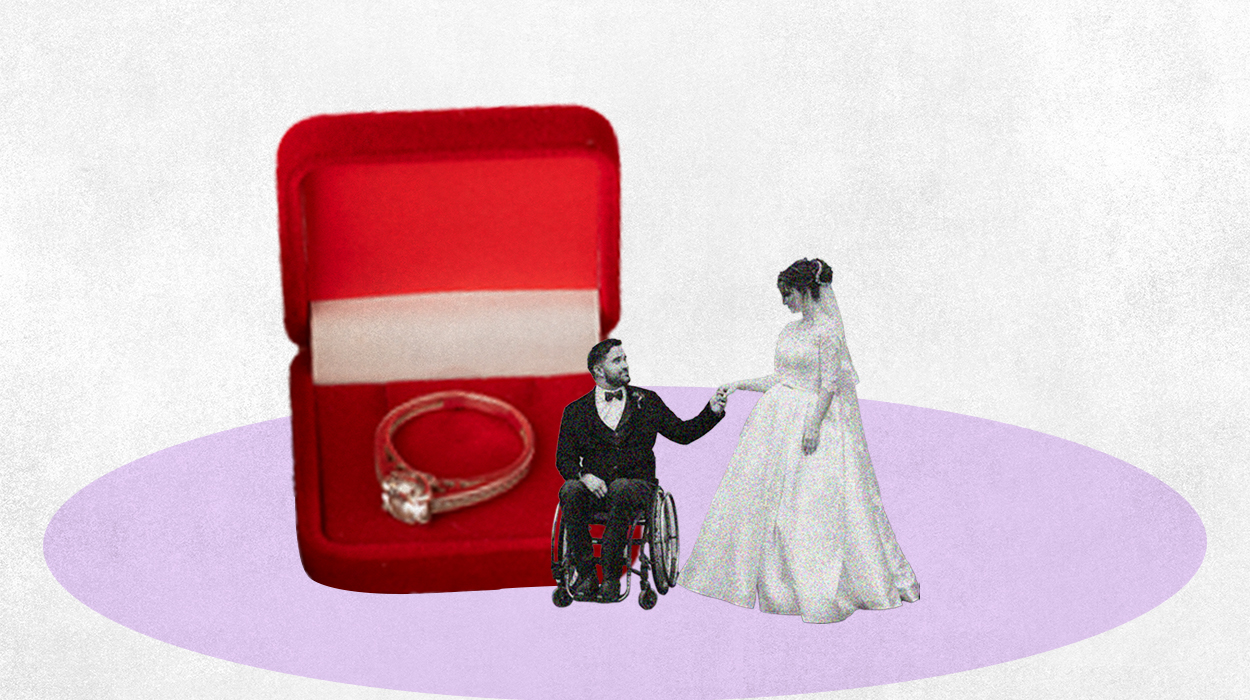Do People With Autism Get Married? Tips For Healthy Relationships 2024

Relationships are always challenging. When someone experiences difficulties with communication that come with Autism Spectrum Disorder (ASD), it may seem like those challenges are insurmountable. It’s not unusual to wonder if people with Autism Spectrum Disorder can maintain a romantic relationship, so do autistic people get married?
The short answer is yes, autistic adults can get married. There is nothing inherent in a diagnosis of Autism Spectrum Disorder that would legally prevent someone from marrying, signing contracts, or otherwise making binding commitments. Additionally, there is often no barrier to them forming genuine and deep relationships.
The question arises because the popular image of someone with ASD is that of someone with special needs and developmental disabilities. It’s important to understand autism is a spectrum and not everyone experiences it in the same way, nor do they face the same challenges. Additionally, while developmental disabilities can prevent someone from marrying, it’s often not that simple.
Can Autistic People Get Married?
Like anyone else, people with ASD seek out meaningful relationships with others. It’s just part of being human. While ASD can place some barriers in the way of those relationships, those barriers are not insurmountable. People with Autism Spectrum Disorder can be affectionate, fall in love, have long-term relationships, and make long-term commitments like marriage.
Marriage is also a legally binding commitment. Some people who experience developmental disabilities as a part of ASD may face questions regarding their competence to enter into that sort of legal commitment. However, that’s not as clear-cut as it may seem. Frequently, legal obstacles can be overcome as well.
In the majority of cases, there’s no question that the person with ASD can make their own choices. While ASD can involve significant developmental,[1] or intellectual disabilities,[2], those disabilities don’t always express themselves in the same way or to the same degree.
What Is Autism Spectrum Disorder?
People with ASD,[3] may face many sorts of challenges, but health professionals look for two specific types of challenges before making a diagnosis. The two areas of concern are:
- Deficits in communication across multiple contexts
- Restrictive and repetitive patterns of behavior, preferences, or interests
In order to be diagnosed with ASD, one must also meet additional criteria as specified in the Diagnostic and Statistical Manual for Psychological Disorders (DSM-V). People with ASD can face social struggles on many levels. Some people may struggle to interpret nonverbal communication or they may be unable to speak entirely. Others may have difficulties understanding social cues, relationship reciprocity, sarcasm, or humor.
Repetitive behavior can also appear in a variety of ways. The repetitive behavior might be physical motion, such as spinning or flapping the arms. Restricted interests are another sort of repetitive behavior, where someone with ASD puts all their focus on just a few, highly specific topics.
Diagnoses – Autistic Person
It’s due to this range that ASD was once several different diagnoses, such as Asperger’s Syndrome and pervasive developmental disorder. Eventually, it was realized that all of those different conditions involved challenges in a few specific ways, so they were all brought together under the single name of ASD.
That’s the ‘spectrum’ part of the name. The ‘disorder’ part means that the challenges are significant enough to interfere with their quality of life. For some people, that means they may not mature as quickly, may struggle with learning disabilities, may have trouble in any conversation, and face a range of other issues.
However, ASD isn’t always that severe. People who were once diagnosed with Asperger’s Syndrome, and often still identify with that diagnosis, may not appear to be facing any challenges at first glance (mild symptoms). People with other types of ASD may also fully be able to function,[4]. While they still face challenges, those challenges don’t normally interfere with them making reasonable decisions. When that’s the case, there is no barrier to them making their own decisions about their life.
Furthermore, people with Autism Spectrum Disorder can use treatments or medications. Using CBD products may help children and adults manage the challenges that come with their condition to improve their quality of life.
Intellectual Disability and Marriage
There is only one reason that people who have mental health problems would be prevented from marrying: If their competence to enter into a legally binding marriage is called into question. This can be a delicate and complex subject. On the one hand, some people want to make commitments to people they love,[5], and would understandably like those commitments to be official.

On the other hand, people with special needs can be vulnerable in many ways. They might need someone to step in and help with aspects of life they struggle with. There is also the fear that people with special needs might not always understand the full consequences of their actions.
The standards for competence vary depending on the state. However, if someone is found incompetent, a guardian is appointed to handle their affairs. In that case, the person with ASD may still be able to marry with the permission of their guardian.
While they may face limited legal barriers to marriage, people with intellectual disabilities could also be prevented from marrying for social and economic reasons,[6].
Limited Income
Some people with ASD may depend on government support, like Social Security income, to pay their living expenses. The amount of support they receive can be affected by income and assets.
Due to the way the rules for government financial assistance are structured, marriage can cause a disabled person to receive less aid. For people in need of assistance, while on a limited income, that can be a real problem.
Most couples with intellectual disabilities face some other challenges, including retaining custody of any children. In reality, while people with ASD can get married, many of them choose not to. One study,[5] found that between 4% and 9% of people with a developmental disability marry.
Relationships And ASD
Autism Spectrum Disorder may not prevent people from forming relationships, but it can make those relationships more challenging in some ways. As with any other aspect of their lives, people with ASD may need a greater amount of patience and assistance in relationships. This can be balanced with the understanding that the struggles they face are genuinely not their fault.
All of the tips for communicating with a person with ASD can also be applied to communication in a relationship,[7]. A few of the most important things to remember are:
Honest Communication Is Vital
Most people with ASD have a hard time understanding body language, non-verbal social cues, humor, and sarcasm, often resulting in confusion or miscommunication The solution is to be direct about feelings and leave little up to interpretation. Even if it seems awkward or inconvenient, it may be the only way to ensure they understand what you’re thinking and feeling.
Overload and Meltdowns

Autistic people can sometimes be easily overwhelmed. They might be triggered by loud noises, a crowd of people, tight clothing, or a bunch of other things. Adults with ASD have often learned strategies and coping skills to prevent a meltdown, such as utilizing noise-canceling headphones, wearing soft or loose-fitting clothing, and using fidget toys. Understanding these limitations in advance and having a plan in place for handling overwhelm is crucial to the survival of a long-term relationship.
Be Patient
If you’re in a relationship with someone with ASD, romantic or otherwise, you may end up in some challenging situations. However, the same is true of relationships with many neurotypical,[8] people. Remember that an autistic person isn’t insulting you or being thoughtless when they fail to understand your cues or they appear to be distant. Rather, they are struggling with a disability and may not have full awareness of their behavior. (Unless you meant that the neurotypical person isn’t trying to insult you or be thoughtless, but is instead struggling with ASD needs?)
Conclusion
People with Autism Spectrum Disorder want to make the same sort of connections with other people that all humans do. While they may, unfortunately, face some struggles when communicating with others, they are still able to be a good friend or even romantic partner and spouse.
+ 8 sources
Health Canal avoids using tertiary references. We have strict sourcing guidelines and rely on peer-reviewed studies, academic researches from medical associations and institutions. To ensure the accuracy of articles in Health Canal, you can read more about the editorial process here
- CDC (2022). Facts About Developmental Disabilities. [online] Centers for Disease Control and Prevention. Available at: https://www.cdc.gov/ncbddd/developmentaldisabilities/facts.html.
- AAIDD_CMS. (2022). Criteria. [online] Available at: https://www.aaidd.org/intellectual-disability/definition.
- CDC (2022). What is Autism Spectrum Disorder? [online] Centers for Disease Control and Prevention. Available at: https://www.cdc.gov/ncbddd/autism/facts.html [Accessed 22 Jun. 2023].
- National Institute of Neurological Disorders and Stroke. (2023). Autism Spectrum Disorder. [online] Available at: https://www.ninds.nih.gov/health-information/disorders/autism-spectrum-disorder [Accessed 22 Jun. 2023].
- International Journal of Culture and Mental Health. (2023). Marriage and family life in people with developmental disability. [online] Available at: https://www.tandfonline.com/doi/abs/10.1080/17447140903205317.
- Special Needs Alliance. (2010). What Happens When Persons Living with Disabilities Marry? [Guide]. [online] Available at: https://www.specialneedsalliance.org/the-voice/what-happens-when-persons-living-with-disabilities-marry-2/.
- AANE (2017). Marriage with Asperger’s Syndrome: 14 Practical Strategies – The Asperger / Autism Network (AANE). [online] The Asperger / Autism Network (AANE). Available at: https://www.aane.org/marriage-aspergers-syndrome-14-practical-strategies/.
- Rabi Samil Alkhaldi, Sheppard, E., Emily and Mitchell, P. (2021). Do Neurotypical People Like or Dislike Autistic People? [online] 3(3), pp.275–279. doi:https://doi.org/10.1089/aut.2020.0059.



